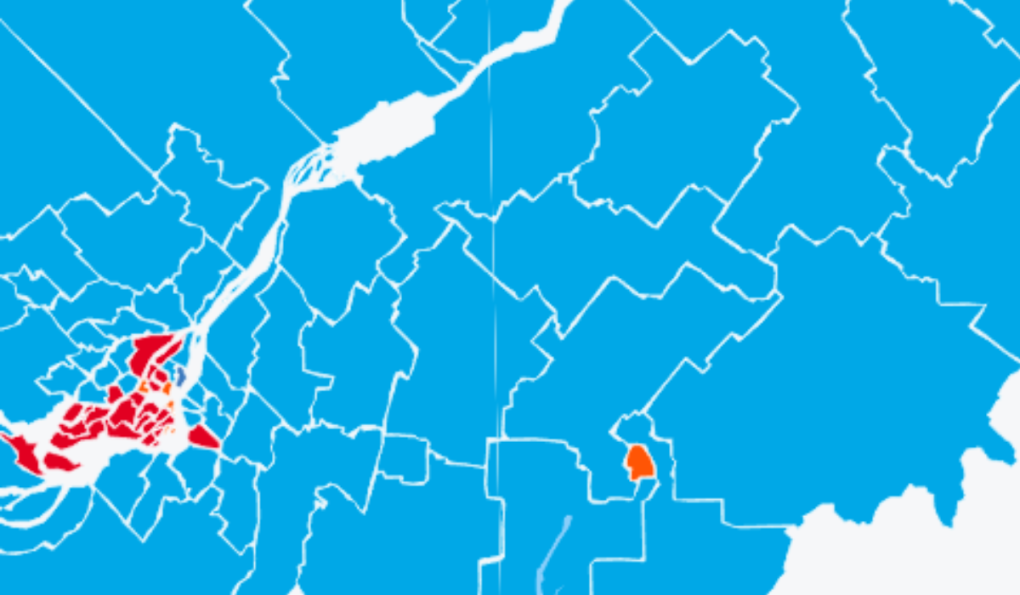'Ideological' divide between Montreal and the CAQ: analyst
Of the 90 seats the Coalition Avenir Quebec (CAQ) won in the Quebec election, only two came from the province's largest city.
It appears Montreal really is an island, in every sense of the word -- and now, in the wake of the election, there's concern the city won't be a priority in the re-elected government.
"There is a sense that [the CAQ doesn't] need Montreal and a sense, on the part of Montrealers, that they feel alienated," McGill University political analyst Daniel Beland told CTV News.
The party won just two seats out of a possibly 27 in Montreal; CAQ candidate Karine Boivin Roy was victorious in Anjou—Louis-Riel, while Chantal Rouleau won her seat in Pointe-Aux-Trembles.
Despite these low numbers, party leader and premier Francois Legault has defended his relationship with the city.
"I think we had a good relationship with the mayor, and we worked hard for Montreal," Francois Legault told reporters last week.
"We have to remember that I'm from Montreal," he added. "I know how important Montreal is for Quebec."
 The election results on Monday meant Montreal's colourful mix of red, orange and dark blue will be in a massive sea of CAQ light blue.
The election results on Monday meant Montreal's colourful mix of red, orange and dark blue will be in a massive sea of CAQ light blue.
Over the last four years, there have been tensions between the city and the province, notably over issues like funding the pink metro line and Bills 21 and 96 -- laws that impact religious and linguistic minorities, which have a larger presence in the metropolis.
"The divide here is also ideological. It's the divide between a progressive left-wing mayor and a centre-right premier," Beland explained.
That mayor, Valerie Plante, did acknowledge the influence of provincial political power within the city. But that influence lies within the opposition, she says.
"I feel like Montrealers wanted to be sure their priorities would be spoken by every party. When you look at it, we have three leaders of the four elected parties here in Montreal," Plante stated on Tuesday.
Liberal leader Dominique Anglade ran and won in the Saint-Henri–Sainte-Anne riding; Quebec solidaire co-spokesperson Gabriel Nadeau Dubois won in Gouin; and Parti Quebecois leader Paul St-Pierre Plamondon got his seat in Camille-Laurin.
Francois Legault, meanwhile, was the only elected leader who ran outside the city, in L'Assomption, of Quebec's Lanaudiere region.
And the riding themselves are unequal, Beland noted.
The Magdalen Islands, for instance, has just over 11,000 eligible voters, while Montreal's D'Arcy McGee riding has over 55,000 -- but both ridings represent one seat in the National Assembly.
"We have a government that is region-centric and an opposition that is Montreal-centric, and that should create an interesting dynamic in the National Assembly," he said.
Legault made a point to say in his victory speech that he grew up in Saint-Anne-de-Bellevue, a suburb on the western edge of Montreal.
But with just two of his party's representatives in Montreal, there are concerns the CAQ will need to build more bridges to the island.
CTVNews.ca Top Stories

Can the Governor General do what Pierre Poilievre is asking? This expert says no
A historically difficult week for Prime Minister Justin Trudeau and his Liberal government ended with a renewed push from Conservative Leader Pierre Poilievre to topple this government – this time in the form a letter to the Governor General.
Two U.S. Navy pilots shot down over Red Sea in apparent 'friendly fire' incident, U.S. military says
Two U.S. Navy pilots were shot down Sunday over the Red Sea in an apparent 'friendly fire' incident, the U.S military said, marking the most serious incident to threaten troops in over a year of America targeting Yemen's Houthi rebels.
Ottawa MP Mona Fortier appointed chief government whip
Ottawa-Vanier MP Mona Fortier has been appointed as chief government whip, the latest addition in a major reshuffle of Prime Minister Justin Trudeau's cabinet.
opinion Tom Mulcair: Prime Minister Justin Trudeau's train wreck of a final act
In his latest column for CTVNews.ca, former NDP leader and political analyst Tom Mulcair puts a spotlight on the 'spectacular failure' of Prime Minister Justin Trudeau's final act on the political stage.
B.C. mayor gets calls from across Canada about 'crazy' plan to recruit doctors
A British Columbia community's "out-of-the-box" plan to ease its family doctor shortage by hiring physicians as city employees is sparking interest from across Canada, says Colwood Mayor Doug Kobayashi.
Bluesky finds with growth comes growing pains - and bots
Bluesky has seen its user base soar since the U.S. presidential election, boosted by people seeking refuge from Elon Musk's X, which they view as increasingly leaning too far to the right given its owner's support of U.S. president-elect Donald Trump, or wanting an alternative to Meta's Threads and its algorithms.
'There’s no support': Domestic abuse survivor shares difficulties leaving her relationship
An Edmonton woman who tried to flee an abusive relationship ended up back where she started in part due to a lack of shelter space.
opinion King Charles' Christmas: Who's in and who's out this year?
Christmas 2024 is set to be a Christmas like no other for the Royal Family, says royal commentator Afua Hagan. King Charles III has initiated the most important and significant transformation of royal Christmas celebrations in decades.
OPP find wanted man by chance in eastern Ontario home, seize $50K worth of drugs
A wanted eastern Ontario man was found with $50,000 worth of drugs and cash on him in a home in Bancroft, Ont. on Friday morning, according to the Ontario Provincial Police (OPP).


































